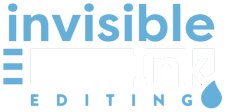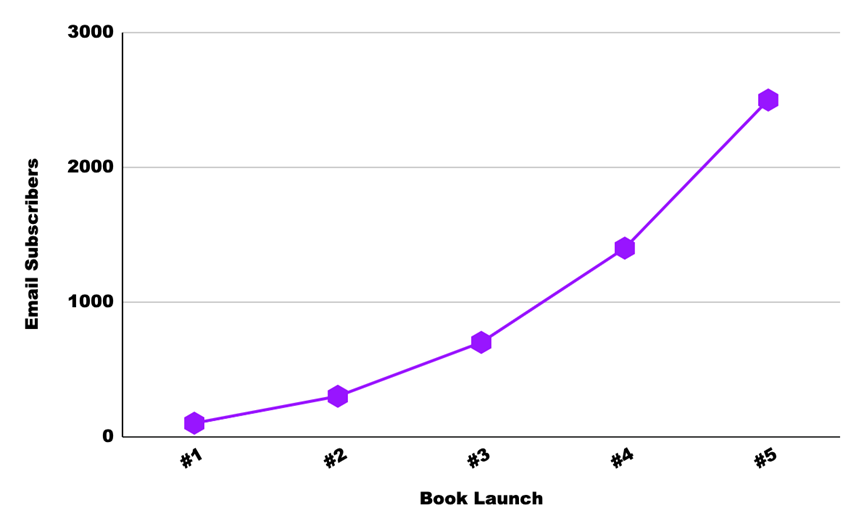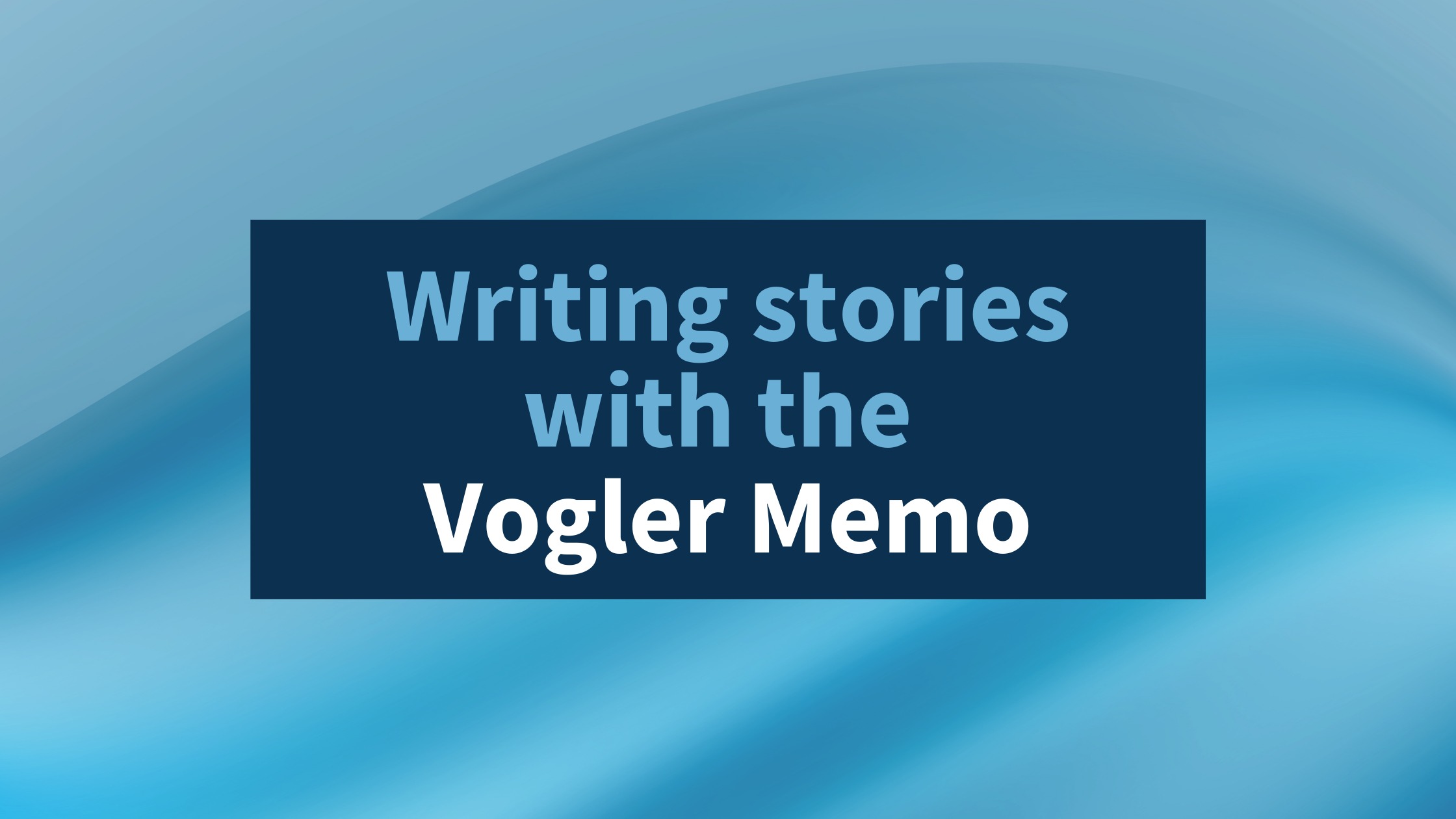Many authors have found success using email marketing to sell their books. But for new authors, growing an email list can seem quite difficult.
However, once you get things going, a healthy email list makes marketing and selling your book easier and easier.
Before we get into the ways an email list can help you make more sales, let’s start by talking about something called “email stacking” and how this affects your marketability. From there, you’ll see how starting your email list now could pay off big time when it comes to your writing career.
Stacked Marketing Efforts
Let’s imagine in your first book launch, you have 100 email subscribers. However, over the course of that launch, you end up gaining another 200 email subscribers. Now, when the time comes, you will have 300 email subscribers for book two.
But the gains don’t stop there. With each consecutive book launch, you’ll gain more and more subscribers to help with your marketing efforts.
This is one of the driving factors that helps series writers gain so much marketability. They have a steadily growing fanbase—with a large portion being perpetuated through email. So, now that we see this in motion, let’s discuss the many ways you can use this ever-increasing list to help with your book sales.
Increased Sales with Each Book
The most obvious effect you’ll see from growing your email list is increased sales for each progressive book launch. By proactively reaching out to your subscribers, you can reach more dedicated fans than ever before—fans who are more much likely than others to buy your new book.
However, it’s not just your latest book that can get more sales. A larger email list can also boost the sales of your older books. That’s because not everyone who subscribes between your later book launches has been around from the beginning. And if they become staunch fans, there’s a good chance they’re going to check out your previous writings.
So, by aggressively building your email list, it’s possible to see an increase in book sales across your entire body of work.
Improve Your Book’s Bestseller Status
Increasing book sales can have a cascading effect. Aside from just generating more income, higher book sales will greatly improve your book’s visibility in the marketplace.
For instance, if you’re an Amazon self-publisher, you’ll see your book’s Amazon ranking increase with the greater amount of sales. This can ultimately lead to your book obtaining the coveted status of Bestseller in your category.
Having a book as a Bestseller is a definite advantage. Bestselling books are always shown before competitors, giving even more visibility to the title. It’s proven that 80% of all Amazon clicks happen on the first page alone, with the top three receiving at least 60% of them. So it would behoove you to strive for Bestseller status, and taking advantage of an extensive email list can greatly improve your chances of getting there.
Improve Your Grade and Number of Reviews
One of the singular most important steps to having a good book launch is getting early reviews. The more book reviews you get when you launch, the better your chance of success will be. And your established email list is an excellent place to start.
Those on your email list are much more likely to not only buy and review your book but give it a positive rating as well. They’ve already subscribed to your style of writing and are part of your fan base. So don’t be afraid to use your email list to reach out and ask for honest reviews.
The best time to do so is right after your launch. You can either send out an email blast to all your subscribers, or simply write out an email in your autoresponder. Be sure to promote your book—in case they haven’t gotten it already—and ask them to drop a review on Amazon after buying it.
Finding the right spot to leave a customer review on Amazon can be a pain. It’s often buried underneath listing information, images, blurbs, and other data. This process alone can discourage your readers from leaving a great review. However, there is a smart way around this.
You can create your own link that will direct your readers straight to your review page. To find out how, check out this great video from Dave Chesson, author of this blog and the man behind Kindlepreneur. He takes you through the step-by-step process of creating your book’s special review link. This will further your chance of one of your readers dropping a juicy review.
Tactics for Growing Your Email List
Hopefully by now you understand that an email list can be a very useful tool for authors. But what are you supposed to write in these emails? And how do you get people to sign up in the first place?
For starters, make it easy for people to sign up by featuring your email list on your website with popups and sign-up forms. These can be built using tools—Dave Chesson has broken down the four best email services for authors, complete with in-depth comparisons in order to help you select the ideal choice.
When building these sign-up forms, use enticing imagery and language to entice people to sign up. You could also offer a discount code for your novels if someone signs up—just send them the code in the confirmation email you send through an automated email platform.
You should also promote your mailing list on any social media sites you use, linking to it in your bios and reminding people when you post.
You also want to make sure your email list doesn’t go stale—sending regular emails will keep people engaged and won’t cause them to unsubscribe when you reach out to them after a long period of silence.
You can use your emails to talk about any subject you like, but try to keep it relevant to your readers. Here are some ideas for emails:
- Promote your books
- Give sneak-previews of what you’re working on
- Send out “deleted scenes” from your novels
- Write unique short stories that feature your characters or style
- Display your book covers and other promotional materials
- Give insights on your personal life
- Provide insights on your writing process
Many of the email platforms out there allow you to schedule emails automatically. You can try using templates like these from DripScripts to generate a few emails and set them up to go out one after another, so you don’t have to worry about writing emails every day. Keep an eye on which emails perform well, and tailor your email marketing strategy to feature more of that kind of content.
Leveraging Email Lists from Other Sites
It’s not just authors who use email lists for marketing. Book promotion sites and book review sites use their email lists to reach readers who are interested in reading more books in a genre. For example, TopSciFiBooks.com has generated over 1,200+ email subscribers who are fans of LitRPG thanks to their compilation of LitRPG books article.
Engaging with these websites and submitting your work to them could help you get featured on those email lists. This will in turn help you grow your profile, and you will find new audiences looking for your books (and signing up for your email list).
So, Does an Email List Matter?
Yes. Having an email list makes a huge difference and can definitely help pave your way towards success.
It can help you sell more books, give you a better chance at being a bestseller, and even provide an early advantage for getting early positive reviews. The power of your email list is real, folks. In fact, it provides one of the highest ROI channels when it comes to marketing.
But what if you don’t have an email list? Well, it’s not too late to get started. And if you’ve already got an established fanbase—say on social media—they’ll probably more than happy to sign up once given the chance. So, if you’ve thought that email just wasn’t the right choice for you, think again. It can prove to be an invaluable tool for success in a highly competitive world of book writing.
About the Author
Dave Chesson is the creator of the wildly successful Kindlepreneur.com, a website devoted to teaching advanced book marketing. Having worked with such authors as Orson Scott Card, Ted Dekker, and more, his tactics help both fiction and nonfiction authors of all levels get their books discovered by the right readers.







